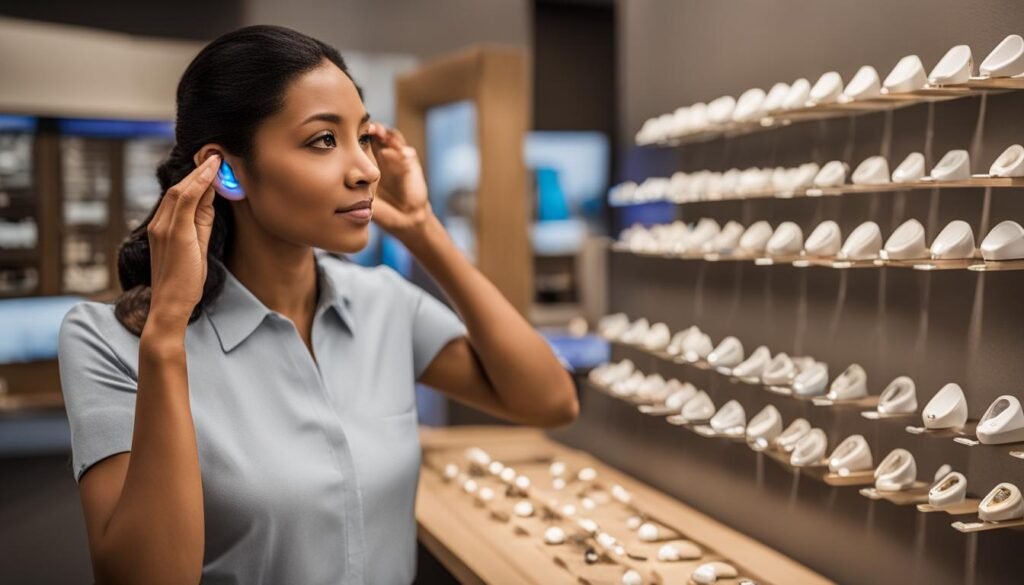“What does hearing aid sound like?” is a common question among individuals considering hearing assistance. A hearing aid, a small yet sophisticated electronic device, is engineered to amplify sounds for those with hearing loss. It primarily comprises a microphone, amplifier, and speaker. The microphone’s role is to capture environmental sounds, transforming them into electrical signals. The amplifier then intensifies these signals, and finally, the speaker delivers these amplified sounds into the ear.

This process is particularly vital for individuals with sensorineural hearing loss, which occurs due to damage to the sensory cells in the inner ear. Additionally, hearing aids come in various styles, including behind-the-ear, in-the-ear, and canal aids, each tailored to different levels of hearing loss and personal preferences. This guide aims to provide a comprehensive understanding of how hearing aids sound and function and how they adapt to various hearing loss conditions to improve sound clarity and quality.
Key Takeaways
- Hearing aids are electronic devices that amplify sounds for individuals with hearing loss.
- They consist of a microphone, amplifier, and speaker.
- Hearing aids are beneficial for those with sensorineural hearing loss caused by damage to the inner ear.
- There are different styles of hearing aids to suit different degrees of hearing loss and personal preferences.
- Understanding what a hearing aid sounds like is essential for individuals with hearing loss.
How Hearing Aids Help with Hearing Loss
Hearing aids play a crucial role in improving the hearing abilities and speech comprehension of individuals with sensorineural hearing loss. This type of hearing loss is typically caused by damage to the hair cells in the inner ear, which can occur due to aging, disease, or exposure to loud noise. Hearing aids work by amplifying sound vibrations that enter the ear, which helps the remaining hair cells detect and convert these vibrations into neural signals that are sent to the brain for interpretation.
The severity of the hearing loss determines the amount of amplification needed from the hearing aid. However, it is important to note that if the hair cells in the inner ear are severely damaged, a hearing aid may be less effective in providing significant improvement. It is always recommended to consult with an audiologist to assess the extent of hearing loss and determine the most appropriate hearing aid solution.
Can smoking cause tinnitus? Our exclusive feature examines the potential link between tobacco use and auditory health, providing a thorough analysis.
Hearing aids are designed to enhance speech comprehension by amplifying and clarifying speech sounds, making them more audible for individuals with hearing loss. In addition to amplification, modern digital hearing aids also offer advanced features such as noise reduction and directional microphones, which help to filter out background noise and focus on speech sounds in challenging listening environments. These features can significantly improve the ability to understand conversations, especially in noisy settings.
While hearing aids cannot fully restore normal hearing, they can greatly enhance auditory perception and improve overall quality of life for individuals with hearing loss. By selecting the right hearing aid based on the type and severity of hearing loss, considering lifestyle and preferences, and working closely with an audiologist, individuals can experience improved speech understanding and better communication in various situations.
Different Styles of Hearing Aids
When it comes to choosing a hearing aid, there are several different styles to consider. Each type has its advantages and is designed to suit different degrees of hearing loss and personal preferences. Understanding the differences between these styles can help you make an informed decision about which one is right for you.
Behind-the-ear (BTE) Hearing Aids
BTE hearing aids are among the most popular and versatile options available. They consist of a case that is worn behind the ear and a plastic earmold that fits inside the outer ear. BTE hearing aids are suitable for individuals of all ages and can accommodate a wide range of hearing loss levels.
In-the-ear (ITE) Hearing Aids
ITE hearing aids are custom-made to fit completely inside the outer ear. They are larger than BTE hearing aids and are generally used for mild to severe hearing loss. ITE hearing aids are easy to handle and can be a good option for individuals who prefer a more discreet appearance.
Canal Hearing Aids
Canal hearing aids come in two styles: in-the-canal (ITC) and completely in-canal (CIC) hearing aids. ITC hearing aids fit the size and shape of the ear canal, while CIC hearing aids are nearly hidden in the ear canal. These styles are smaller and less visible than both BTE and ITE hearing aids, making them a great choice for those who are looking for a more discreet option.
Uncover the facts about how much hearing loss requires a hearing aid
Overall, the different styles of hearing aids offer unique benefits and features, allowing individuals to choose the one that suits their needs and preferences best. Whether you opt for a BTE, ITE, or canal hearing aid, it’s important to consult with an audiologist who can guide you in selecting the most appropriate style for your specific hearing loss requirements.
How Hearing Aids Work
Hearing aids operate using various electronics to amplify sound and improve auditory perception. There are two main types of hearing aids: analog and digital.
Analog hearing aids convert sound waves into electrical signals that are then amplified and delivered to the ear. These devices are adjustable and can provide different levels of amplification based on individual needs. Analog hearing aids are generally less expensive than digital ones and can be suitable for individuals with milder hearing loss.
Digital hearing aids, on the other hand, utilize advanced technology to process sound waves before amplification. These devices convert sound into numerical codes and apply sophisticated algorithms to enhance speech and filter out background noise. Digital hearing aids offer a greater degree of customization, allowing specific adjustments for different listening environments. They can provide a more natural listening experience and are often recommended for individuals with moderate to severe hearing loss.
Regardless of whether they are analog or digital, all hearing aids aim to amplify sound and improve the clarity of speech. These devices can significantly enhance auditory perception and help individuals with hearing loss regain their ability to communicate and engage with the world around them.
Choosing the Right Hearing Aid
When selecting a hearing aid, it is crucial to consider various factors to ensure the best fit for your needs. The type and severity of your hearing loss will play a significant role in determining the most suitable hearing aid for you. Consulting with an audiologist is highly recommended as they can provide expert guidance and tailor their recommendations based on your specific requirements.
Read Also: The Best Glasses to Wear with Hearing Aids
One important aspect to consider is your lifestyle. Think about the environments in which you spend the most time. If you frequently engage in social activities or work in noisy settings, you may benefit from hearing aids that offer advanced noise reduction and speech enhancement features.

Another crucial consideration is your budget. Hearing aids come in a range of prices, and it’s essential to find one that fits within your financial means. Keep in mind that hearing aids are an investment in your overall well-being, so it’s worth exploring financing options or insurance coverage that may be available to you.
Factors to Consider When Choosing a Hearing Aid:
- The degree and nature of your hearing loss
- Your lifestyle and typical listening environments
- Your budget and available financing options
- Your preferences regarding the size, style, and technology of the hearing aid
- The availability of customer support and maintenance services
By carefully considering these factors and working closely with your audiologist, you can make an informed decision when selecting a hearing aid that will enhance your auditory perception and improve your quality of life.
A Guide to Buying a Hearing Aid: Important Questions to Ask
Before buying a hearing aid, it’s crucial to gather all the necessary information to make an informed decision. Asking the right questions can help ensure that you choose a hearing aid that meets your needs and provides the support required. Here are some important questions to ask when purchasing a hearing aid:
- What features would be most useful for my specific hearing needs? Understanding the available features and technologies can help you narrow down your options. Consider features like Bluetooth connectivity, rechargeability, noise reduction, and directional microphones based on your lifestyle and hearing requirements.
- What is the total cost of the hearing aid, and what does it include? In addition to the initial purchase cost, inquire about any additional fees for consultations, fittings, follow-up appointments, and aftercare services. Understanding the total cost will help you plan your budget effectively.
- What is the warranty, and what maintenance services are covered? Ensure that the hearing aid comes with a comprehensive warranty that covers repairs, replacements, and necessary maintenance. Clarify the duration of the contract and any associated costs beyond the warranty period.
- What adjustments and servicing are provided by the audiologist? Ask about the frequency of follow-up appointments and adjustments that may be required to optimize the performance of your hearing aid. Understanding the ongoing support and maintenance services offered by the audiologist is essential.
- What instruction and support will be available to help me adjust to wearing a hearing aid? Adjusting to a hearing aid can take time and practice. Ensure that your audiologist provides detailed instructions on how to use and care for your hearing aid. Inquire about any support resources or counseling options available to help you adapt to your new device.

By asking these important questions, you can make a more informed decision when choosing a hearing aid. Remember, finding the right hearing aid involves considering your individual hearing loss, lifestyle, and budget. Working closely with an audiologist throughout the process will ensure that you select a hearing aid that best suits your needs and enhances your auditory perception.
Conclusion
Hearing aids play a crucial role in enhancing auditory perception for individuals with hearing loss. By understanding the different styles and functionalities of hearing aids, individuals can make an informed selection that suits their specific needs.
Choosing the right hearing aid involves considering factors such as the type and severity of hearing loss, lifestyle, and budget. Consulting with an audiologist is highly recommended to ensure the most suitable hearing aid is chosen.
While hearing aids cannot restore normal hearing completely, they can significantly improve auditory awareness, allowing individuals to participate more fully in daily activities. By managing expectations and adjusting to the use of hearing aids over time, individuals can experience enhanced hearing and enjoy an improved overall quality of life.
Remember, a hearing aid selection guide is a valuable resource in the journey to better auditory perception. Empower yourself by choosing the right hearing aid and working closely with an audiologist to make the most of this important tool.
Frequently Asked Questions
What is a hearing aid?
A hearing aid is a small electronic device that amplifies sounds for individuals with hearing loss.
How does a hearing aid work?
The microphone picks up sounds from the environment, the amplifier increases the power of the signals, and the speaker delivers the amplified sound into the ear.
Who can benefit from a hearing aid?
Individuals with sensorineural hearing loss caused by damage to the small sensory cells in the inner ear can benefit from a hearing aid.
What are the different styles of hearing aids?
The different styles of hearing aids include behind-the-ear (BTE), in-the-ear (ITE), and canal aids.
How do analog hearing aids work?
Analog hearing aids convert sound waves into electrical signals and amplify them.
How do digital hearing aids work?
Digital hearing aids convert sound waves into numerical codes before amplifying them, allowing for more precise customization of amplification based on individual needs.
How do I choose the right hearing aid?
It is recommended to consult with an audiologist to determine the most suitable hearing aid based on factors such as the degree of hearing loss, lifestyle, budget, and preferences.
What questions should I ask before buying a hearing aid?
Some important questions to ask include the features that would be most useful, the total cost of the hearing aid, warranty details and coverage for maintenance and repairs, adjustments and servicing provided by the audiologist, and the instruction and support available.
How long does it take to adjust to wearing a hearing aid?
The adjustment process varies for each individual, but regular practice, familiarization with the features, and working closely with the audiologist can help individuals adjust more effectively.



